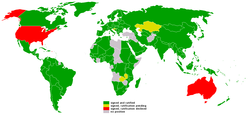The “Kyoto Protocol” is an amendment to the United Nations Framework Convention on Climate Change (UNFCCC). Ratifying countries commit to reduce their emissions of carbon dioxide and five other greenhouse gases, or engage in emissions trading if they maintain or increase emissions of these gases.
The “Kyoto Protocol” was negotiated in December 1997 in Japan and entered into force in February 2005, 90 days after Russia had ratified the treaty. The world’s biggest emitter are the USA with an annual production of roughly 6 million tons of CO2. Together with Australia, the Bush administration refrained from ratifying the treaty, officially because of fears that a ratification could hamper economic growth and lead to comparative disadvantages given that China or India are yet exempted from the framework of the protocol. There were reports about White House officials consciously watering down approved internal documents that link human activity with greenhouse gas emissions.

Countries rejecting the ratification of the Kyoto protocol, first and foremost the USA and Australia, refuse to contribute their part to global solutions for today’s challenges and are abdicating their responsibility for the world community. Problems caused by greenhouse gases have a spatial dimension, affecting people, nature and climate independently from national borders. Though, the monitoring, the handling and the reduction of emissions must be tackled on a higher, supranational level, involving a supranational collaboration of all gas-emitting countries in environmental issues. The Kyoto protocol would be a first step on the way towards the formation of a supranational regulatory body that cares about climate issues. This idea is a typical feature of federalism: harmonizing and enhancing national environmental policies by delegating parts of them to a more adequate (here: global) level. But, as always, federalist solutions and state egoism don’t fit together. As long as there are freeriders attaching more weight to their particular interests than to their responsibility towards future generations, also the major contemporary challenge of climate degeneration cannot be brought under control properly. The European Union, being an example of supranational integration, has a big potential in promoting international regimes as Kyoto and should definitely raise its voice and exercise pressure against notorious freeriders, whose behaviour gives fallacious prejudices to transition countries.


Follow the comments: |
|
